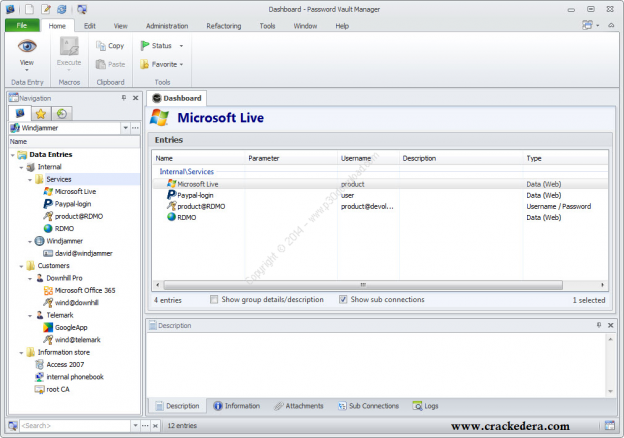

Because of this, KeePass does have a steeper learning curve.ġPassword is built for teams and individuals.
#Passwords manager vault full
KeePass is best used by individuals and small companies that don’t mind working with the plugin architecture to add the necessary features they need to enjoy the full functionality found in other password managers. KeePass: Best for users okay with using the plugin architecture
#Passwords manager vault free
KeePass is free to use and can be installed on Android, iOS, Linux, macOS and Windows. Passwords are also encrypted while KeePass is running, which means even when KeePass dumps the process to disk, the passwords aren’t revealed. The password manager is protected against dictionary and guessing attacks by transforming the master password key hash using a key derivative function. KeePass supports the Advanced Encryption Standard as well as the Twofish algorithm for the encryption of the entire database.
#Passwords manager vault portable
In addition, KeePass includes the features we’ve all grown accustomed to in a password manager, such as support for all types of logins, master password protection, AES and Twofish algorithms, random password generator, portable version, import and export, and a search tool. This makes it possible to use KeePass for teams and not worry that someone will overwrite another team member’s work as they are making changes to an entry. KeePass might be purpose-built for individuals, but it offers a file-locking feature that makes it more than possible to use this tool for teams.Įssentially, you store the vault on a network share, and when the vault is unlocked and someone else attempts to open the same vault, the second user will be prompted to either open the vault in read-only mode or open it in normal mode, thereby stealing the lock from the first user. Pricingīitwarden has two plans: Business ($3/user/month for teams or $5/user/month for enterprise organizations) and Personal (Free and $10/year/user for individuals, or Free and $3.33/user/month for families). Organizations make it possible for users to share isolated vaults that have no access to personal vaults so companies can create multiple vaults to serve different purposes. Thanks to the Organizations feature, Bitwarden is best for organizations that need to be able to share multiple vaults with different teams and need a high level of flexibility.

Bitwarden: Best for teams sharing multiple vaults

You can create multiple Collections and share each one with a different team.Ĭombine the Collections feature with a best-in-class interface that is user-friendly enough for anyone to use, and you have a great password manager ready for your teams. Instead, you create a Collection of passwords and then share it with a team. Collections makes it possible to share only specific passwords with certain teams, which means you don’t have to worry about every team member seeing all of your passwords. Bitwarden Send to send either files or texts securelyīitwarden’s Collections feature is a standout.Master password reprompt for extra security.Logins, credit cards and secure notes vault entry types.Standout featuresīitwarden comes with a number of very important features for teams and individuals, including the following: On top of that, Bitwarden servers only store encrypted and hashed data. This means no one can see, read or reverse engineer your data. With Bitwarden, all of your data is encrypted and/or hashed on your local device. This includes a random password generator, cloud sync, favorites, categories, custom fields, folders, multiple account support, password send, and import and export. With this open-source take on the password manager, you get all the bells and whistles to which you’re accustomed. Fortunately, my shortlist of password managers are great for teams.īitwarden is one of my favorite password managers, and not just because it installs natively on Linux. If you need a password manager that can be shared between teams, your options are a bit more limited. To that end, there are plenty of password managers to choose from, each of which will serve you better than trying to memorize every password or writing them down on a piece of paper. SEE: Mobile device security policy (TechRepublic Premium) We need password managers to keep us from using lazy, weak passwords, and we need them for storing those secrets in a protected vault. We’ve reached a point where password managers should no longer be considered optional.


 0 kommentar(er)
0 kommentar(er)
